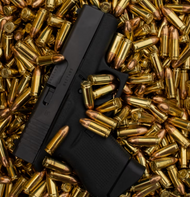What Grain Is Best For 9MM?
Oct 20th 2023
Selecting the ideal ammunition for your 9MM handgun is a crucial decision, and one of the primary considerations is the grain of the bullet. The grain of a bullet plays a pivotal role in determining the cartridge's performance, making it vital to understand what it means, how it influences your shooting experience, and which grain is best suited for different purposes.
The optimal grain for your 9MM ammunition largely depends on your specific shooting needs and preferences. There isn't a one-size-fits-all answer because the grain of a bullet affects factors such as recoil, velocity, and terminal ballistics. To find the best grain for your 9MM, it's essential to consider the intended use:
- Self-Defense: In self-defense scenarios, many prefer heavier grain bullets, typically in the 124 to 147-grain range. These bullets offer deeper penetration and controlled expansion, ensuring they are more likely to incapacitate a threat effectively.
- Target Practice: Lighter grain bullets, often in the 115-grain range, are commonly chosen for target practice. They offer less recoil, making them more comfortable for extended shooting sessions, and are often more cost-effective.
- Competition Shooting: Depending on the specific discipline within competitive shooting, you may find various grain preferences. Some competitors opt for lighter grain bullets to reduce recoil, while others may choose heavier options for better accuracy at longer ranges.
Ultimately, the best grain for your 9MM ammo is a balance between your shooting goals and comfort level with recoil. It's essential to test different grains to find the one that best aligns with your preferences.
What Is Ammo Grain?
The term "grain" refers to the unit of measurement for bullet weight and is equivalent to 1/7000th of a pound. In the context of ammunition, the grain specifies the weight of the bullet portion of the cartridge. For example, a 115-grain 9MM cartridge means the bullet within the cartridge weighs 115 grains.
The grain of a bullet influences various performance factors, including velocity, trajectory, and terminal ballistics. Heavier grain bullets tend to have slower velocities but may penetrate deeper upon impact, while lighter grain bullets often travel at higher speeds but may offer less penetration and more expansion.

What Are Different Grains Used For?
The choice of grain weight for your 9MM ammunition serves specific purposes:
- Lighter Grain (e.g., 115 grains): Lighter bullets are often favored for target practice due to their reduced recoil and economical cost. They are ideal for extended shooting sessions and improving accuracy.
- Medium Grain (e.g., 124 grains): Medium-weight bullets are versatile and can be used for self-defense as well as general range practice. They offer a balance between penetration and recoil, making them a popular choice for all-around use.
- Heavier Grain (e.g., 147 grains): Heavier bullets are commonly selected for self-defense scenarios. They penetrate deeply and expand reliably upon impact, making them effective for stopping threats.
- Specialty Grains (e.g., 135 grains, 147 grains +P): Some manufacturers offer specialty grain weights that are designed for specific purposes. These may include +P (overpressure) loads or hybrid designs to enhance performance in particular scenarios.
What Grain Is Best For Self Defense?
The best grain for self-defense in a 9MM depends on a combination of factors, including the firearm's reliability, your personal comfort with recoil, and the ammunition's terminal ballistics. Many consider 124 to 147-grain bullets as the best options for self-defense. These grains offer deep penetration and reliable expansion, which are critical factors in stopping a threat effectively. However, it's crucial to test different loads with your specific firearm to ensure reliable functioning and accuracy.
Additionally, some ammunition lines, such as +P (overpressure) loads, offer enhanced performance and can be effective for self-defense, but they also generate higher recoil, which may affect follow-up shots.
What Grain Is Best For Target Practice?
Lighter grain bullets, typically around 115 grains, are often considered the best choice for target practice in a 9M. These bullets generate less recoil, making your shooting experience more comfortable during extended practice sessions. Additionally, lighter grain ammunition is usually more affordable, allowing you to practice without breaking the bank. However, while lighter grains are great for practice, it's beneficial to occasionally use the same grain weight you intend to carry for self-defense to familiarize yourself with its performance in your firearm.
In conclusion, choosing the right grain for your 9MM ammunition is a personal decision influenced by factors like your shooting goals, comfort with recoil, and the firearm's reliability. Lighter grains are typically preferred for target practice, while heavier grains, such as 124 to 147 grains, are often chosen for self-defense due to their deep penetration and reliable expansion. It's essential to test various grain weights to determine what works best for your specific needs and firearm.


